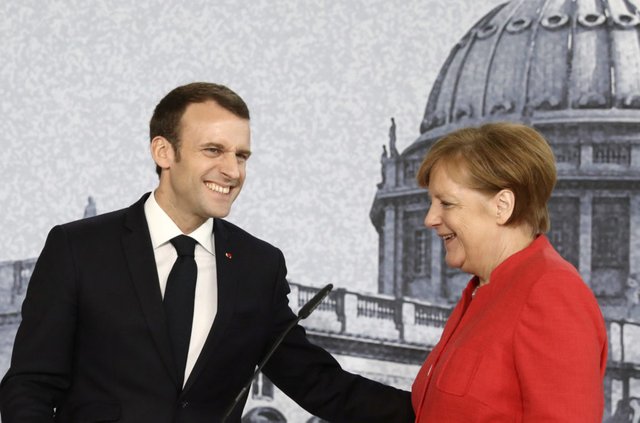The EU can thwart the cash flow to member states in the east

Emmanuel Macron and Angela Merkel on the construction site of the Humboldt Forum in Berlin April 19th.
Poland and Hungary are in danger of being hit hard when the European Commission presents its long-term budget proposal for the years after 2020.
On Wednesday, the EU Commission presents its budget budget proposal for the full seven-year period from 2021 to 2027. It will be the starting point for harsh political negotiations that, in the worst case scenario, can be withdrawn for several years.
Budget Commissioner Günther Oettinger has already made it clear that he will ask member countries to spend significantly more money on the table than today.
But it is also expected that he will propose controversial new measures to wreck money away from disobedient member states in the east.
Rule of law Mechanism:
One of the measures expected is a so-called state-of-the-art mechanism. Exactly what the new mechanism will look like is not yet known, but EU Justice Commissioner Vera Jourová has confirmed that it is on its way.
According to the Financial Times, the EU Commission is likely to implement the mechanism in the EU's overall budget framework, more specifically in Article 322 of the Treaty on the Functioning of the EU.
The mechanism will, according to plan, make it easier for the EU to retain budgetary resources, so as to put pressure on member states that undermine the rule of law and democracy.
There is particular concern about the political developments in countries such as Poland and Hungary.
Can make money south:
At the same time, it is expected that the EU Commission will propose more indirect ways to increase economic pressure.
According to diplomatic sources, the idea is to change the rules for the EU budget funds that go to social and economic leveling in Europe. Today, this pot accounts for 35 percent of the EU's total budget.
According to the Financial Times, the EU Commission's proposal is to introduce a number of new criteria for the payment of equalization funds.
For example, France's President Emmanuel Macron has proposed that direct funding be given to communities that receive many asylum seekers.
Another suggestion is that more of the money should go to countries with high youth unemployment.
Thus, less money will travel to the east, which generally has a very restrictive asylum policy and relatively low youth unemployment. Countries in the south, on the other hand, want more.
Divided opinions:
The new proposals have divided the EU member states, and a difficult political drag is after all to be judged.
Polish Foreign Minister Jacek Czaputowicz said in an interview with the Associated Press news agency that the Polish government is "very negative" to the EU Commission's ideas.
"We look at this as an attempt to exert political pressure on individual countries," he says.
Ambassadors from several member states have been dissuading their dissatisfaction at an EU meeting last week, where the EU Commission informed about the plans.
Other member countries - including Germany and France - believe it is high time that the EU imposes stricter conditions for providing money.
Inside the EU Commission, discussions were not yet finished Monday evening. It is expected that the commissioners will continue to brush on the proposal until it will be presented Wednesday afternoon.